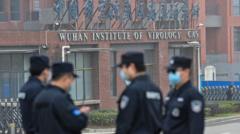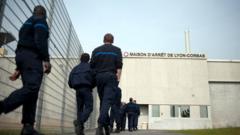Controversy continues over the pandemic's origins as new intelligence surfaces, challenging previous WHO conclusions.
German Intelligence Agency Assesses High Probability of Covid Lab Leak

German Intelligence Agency Assesses High Probability of Covid Lab Leak
Insights reveal BND's 2020 evaluation suggested an 80-90% chance of a lab-related origin for the coronavirus.
Germany's foreign intelligence agency, the BND, reportedly believed there was an 80-90% probability that the coronavirus pandemic stemmed from an accidental leak at a Chinese laboratory. This assertion comes from revelations in two German publications that disclosed a previously unpublished assessment conducted by the BND in 2020. The report suggested that the Wuhan Institute of Virology had engaged in experiments modifying viruses to enhance their transmissibility to humans.
In response to these allegations, China has reiterated its denial, insisting that any investigation into the origins of Covid-19 should be left to scientists. They referenced a World Health Organization (WHO) inquiry that deemed a lab leak "extremely unlikely." However, the debate over the origin of the virus remains unresolved, with many experts emphasizing the lack of definitive evidence for either side of the argument.
The lab leak hypothesis, once dismissed as mere speculation, has gained traction in some intelligence circles. Earlier this year, the CIA reported that a lab-related origin was "more likely" than a zoonotic transfer from animals, although they expressed low confidence in this finding.
The BND's assessment was made under a project dubbed "Saaremaa," which met in Berlin in 2020 to evaluate potential Covid origins. While the agency concluded that a lab leak was plausible, emerging indictments of safety protocol violations at the Wuhan lab added to their concerns. The findings were reportedly shared with the CIA in late 2022.
Former Chancellor Angela Merkel's office commissioned the assessment, but its details remained confidential until now. In light of these developments, both the BND and the current German Chancellor Olaf Scholz opted not to comment further.
China's Foreign Ministry spokeswoman, Mao Ning, responded assertively, suggesting that the investigation into Covid's origins should adhere to a scientific approach and criticizing any political manipulation surrounding the issue. She highlighted that the conclusions made by the joint China-WHO expert team—who deemed a laboratory leak "extremely unlikely"—have been accepted by both the international and scientific community.
Following the WHO’s investigation in early 2021, which included a visit to the Wuhan laboratory, criticisms have emerged regarding the thoroughness of their examination of the lab-leak theory. Some scientists have voiced concerns that the theory was dismissed too casually in the report.
The prevailing natural origin hypothesis maintains that Covid-19 emerged from bats, transmitting to humans likely through an intermediary animal. While initially widely accepted, this theory faces scrutiny due to the inability to identify a virus that closely matches Covid-19 in animal reservoirs, prompting some scientists to rethink its viability.
In response to these allegations, China has reiterated its denial, insisting that any investigation into the origins of Covid-19 should be left to scientists. They referenced a World Health Organization (WHO) inquiry that deemed a lab leak "extremely unlikely." However, the debate over the origin of the virus remains unresolved, with many experts emphasizing the lack of definitive evidence for either side of the argument.
The lab leak hypothesis, once dismissed as mere speculation, has gained traction in some intelligence circles. Earlier this year, the CIA reported that a lab-related origin was "more likely" than a zoonotic transfer from animals, although they expressed low confidence in this finding.
The BND's assessment was made under a project dubbed "Saaremaa," which met in Berlin in 2020 to evaluate potential Covid origins. While the agency concluded that a lab leak was plausible, emerging indictments of safety protocol violations at the Wuhan lab added to their concerns. The findings were reportedly shared with the CIA in late 2022.
Former Chancellor Angela Merkel's office commissioned the assessment, but its details remained confidential until now. In light of these developments, both the BND and the current German Chancellor Olaf Scholz opted not to comment further.
China's Foreign Ministry spokeswoman, Mao Ning, responded assertively, suggesting that the investigation into Covid's origins should adhere to a scientific approach and criticizing any political manipulation surrounding the issue. She highlighted that the conclusions made by the joint China-WHO expert team—who deemed a laboratory leak "extremely unlikely"—have been accepted by both the international and scientific community.
Following the WHO’s investigation in early 2021, which included a visit to the Wuhan laboratory, criticisms have emerged regarding the thoroughness of their examination of the lab-leak theory. Some scientists have voiced concerns that the theory was dismissed too casually in the report.
The prevailing natural origin hypothesis maintains that Covid-19 emerged from bats, transmitting to humans likely through an intermediary animal. While initially widely accepted, this theory faces scrutiny due to the inability to identify a virus that closely matches Covid-19 in animal reservoirs, prompting some scientists to rethink its viability.






















